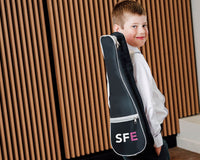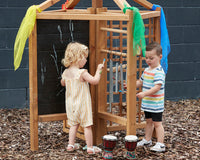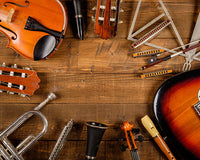Playing an instrument has many benefits. Children especially benefit from early exposure to music as it can develop other important skills. Children who learn to play an instrument master a skill they can use for the rest of their lives. They also learn to follow instructions, love music and have a means of self-expression. If you want to introduce your child to playing a musical instrument, you'll have lots of potential choices. You want to find one that meets many criteria. This includes the child's age, their physiology, their developing interests and their overall personality. Think carefully and you'll find an instrument that gives your child something they can share with others for the rest of their lives.
The Childs Age
Learning to play an instrument at an early age encourages children to begin the road to mastery. When children spend time playing at a young age, they develop a foundation they tap into as they grow older. At the same time, younger children may not have the developmental skills they need yet. In that case, it's best to consider instruments that allow the child to master the basics. Good choices at an earlier age include the
Piano and
Drums as these have musical passages the child can learn quickly.

Physical Fitness Level
Children have varying physical fitness levels. Some children develop physically faster than others. One boy may have a growth spurt early in life while his peers may get such growth spurts later in life. Certain instruments are heavy. A child may find it hard to carry a tuba or a cello from place to place. In that case, it's best to consider instruments that are smaller and lighter such as a
Flute or a
Violin. This makes it easier for the child to hold the instrument and learn what is expected of them during lessons.

Height
Height is another important consideration that many parents need to think about when picking out an instrument. For example, an older child who is taller than average can find it easier to learn to
play the guitar. Children need to able to stretch across the surface of the instrument to pay the full range of notes for any given piece. Keep in mind that many instruments come in varied sizes. However, as the child grows, you will have to pay for a new musical instrument if the child outgrows the smaller one.

Oral Ability and Size of Hands
Brass and woodwind instruments have highly specific techniques that the child must master in order to play them properly. The mouth placement must be just right. Children who are in need of braces may find that using certain instruments can hurt the braces. It may be better to begin lessons with these instruments once the treatment has been completed.
The size of a child's hands will also play a role in determining what kind of instrument might be ideal for their needs. Children who have longer fingers may find it easier to master piano scales. At the same time, there are ways to overcome this issue. Learning to play the
Piano can serve as a gateway to master music in general. This is because the piano has room to display the musical notes that the child can easily see.

The Child's Personality
Even at a young age, it's obvious that children have vastly different personalities. Some children love being the center of attention. They relish the opportunity to perform solos in front of a large audience. In that case, consider instruments like the
Trumpet or
Violin. These are instruments that are often the center of attention during a performance often with long solos that let the child show what they've mastered to others.
Other children may love music but prefer to be part of a large group rather than being the focus of attention. A child may prefer to learn the
Oboe,
Flute or the
Piano as these are typically played as part of a larger group of people. Parents should also consider if the child get frustrated easily or can stick with something over a longer period of time. A child who can spend hours just learning a few standard tunes on the violin is likely to stick with that instrument over time. Children who love to explore more complicated musical skills might want to learn to play an instrument that requires a lot of concentration such as the
French Horn.
Like what you've read from Brittney? You can find more of her work at DHR Guitar Experience where she is a contributing writer and media specialist.
























